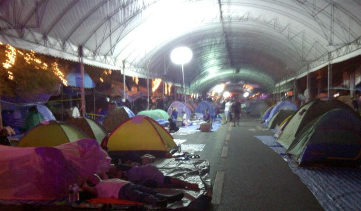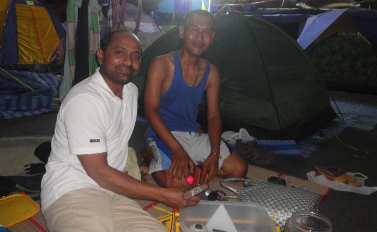Greatness in simplicity – By Shirish Ravan
21 September 2012
 As sun went down in Bangkok, weather started cooling down and I set out for a brisk walk after dinner. Being closer to the Democracy Square, I walked through temporary shelters housing thousands of protesters, people seeking better Thailand who want to change in the way Thailand is governed. This has become my favourite place to visit, as a life in those shelters is an ecosystem in itself. The place is clean, small tents are placed systematically on the mat covered floor. Facilities like food, drinking water, mobile toilets and baths are of optimal standard. Thousands of middle class people have left their homes for months and stay in these temporary shelters. Often it is said that these people stay here just because they get free food, pocket money, free entertainment etc. No… these are not enough reasons to motivate people to live away from their loved ones, in temporary shelters, in scorching heat of Bangkok. More I knew them, more I understood them.
As sun went down in Bangkok, weather started cooling down and I set out for a brisk walk after dinner. Being closer to the Democracy Square, I walked through temporary shelters housing thousands of protesters, people seeking better Thailand who want to change in the way Thailand is governed. This has become my favourite place to visit, as a life in those shelters is an ecosystem in itself. The place is clean, small tents are placed systematically on the mat covered floor. Facilities like food, drinking water, mobile toilets and baths are of optimal standard. Thousands of middle class people have left their homes for months and stay in these temporary shelters. Often it is said that these people stay here just because they get free food, pocket money, free entertainment etc. No… these are not enough reasons to motivate people to live away from their loved ones, in temporary shelters, in scorching heat of Bangkok. More I knew them, more I understood them.
While they slog in these tents to strive for better Thailand, they try to be creative. Often they engage themselves in various activities such as cleaning, watching political speeches on TV, making crafts, stitching clothes, repairing shoes and bags, and so on.
There was a specific reason why I walked through the protest area today evening. I was looking for someone who would fix handle of my favourite Samsonite backpack that holds laptop & documents during my travel. There I saw a mid-age man sitting on floor repairing shoes.
‘Would you mind fixing handle of my bag?’ I asked him politely.
‘My pleasure, please sit down. Let me get my tools’ He replied.

He got onto the task. I was impressed with his workmanship, as he weaved nylon string through the handle. He was well focussed, peaceful and seems not troubled by any of the circumstances around him. My curiosity led to our further conversation.
‘Where is your home? In Bangkok itself?’
‘No, it’s about 30 km on outskirts of Bangkok; I work as a Hydrologist in Irrigation Department of Thai Government’
‘Wow!!! How come you stay here?’ I realised he is well educated person.
‘I am here because I believe, being part of the fight against corruption, we can change Thailand. When I visited this place first time, I saw inconvenience people faced as they didn’t have access to basic services such as repairing their shoes or bags. You know what it meant when your bag or shoe is broken. I have learned shoe repairing skills during my school days. I decided to use it to serve people and reduce their suffering. I just purchased few tools and put up here to serve my fellow people’.
‘Amazing!!!, does your family allow you to stay away from home and be with these protesters?’
‘Yes, I have a normal family life, but I lead a bit different life style’ He pointed at his stylish bike. ‘I use this bicycle to go to the office in the morning. I straight come back to my tent in the evening and start repairing shoes/bags till I get tired and sleep’.
‘What motivates you?’ I really wanted to know more about his personality.
‘I am associated with Santi Asoka group dedicated to serve people and save environment. Our philosophy is to ‘act through actions’. We do eco-farming. Excess harvest, the ‘bio-products’, are sold in market. We run education camps for children to teach moral values of life to make them sensible citizen of the World’. His eyes were still focussed on reinforcing nylon thread to fix handle of my bag.
I glanced through a magazine he handed over to me and learned a lot about Santi Asoka group, a wonderful ‘value based’ institution thriving in Thailand, making proud of Thai culture and Buddhist values.
‘Do you meditate?
‘I don’t meditate in these tents where I stay with thousands others. My work and service to people is my meditation. This section of a shelter is peculiar. Smoking and alcohol consumption is not permitted here. We eat pure vegetarian food. All people around me serve others with whatever skills they have’.
He pointed his finger to other end, ‘Look there, this group offers free training on basket weaving or making flower pots and other artifacts’.
He placed a beautiful handmade basket in front of me as a sample.
After he completed his work, I politely asked him if he would accept some money for the favour he offered to me. He denied by putting both hands together with typical Thai gesture.
‘There is no money business here. Services are free and voluntary’
It took him about 40 minutes of focussed work, and not only had he fixed the handle, but also reinforced nylon thread in all joints so that bag remains sturdy for a long time. This was beyond my expectation. His dedication to the service was amazing.
I bowed to him with respect. That was my respect to his personality, humility and greatness hidden behind his simplicity. I admired a social worker in him, who otherwise is a government official. He bowed back to me and smiled with no expectation.
Next evening I again walked to him. He was busy repairing shoes while most of the people around him were relaxing. This time I carried a precious gift for him. It was a beautiful Indonesian Batik shirt I purchased for myself during my recent visit to Yogyakarta. I wanted to gift something to him that I really liked and loved. I respectfully offered him this gift, which he gladly accepted, although he never expected me to visit him again. This time he bowed to me to express his appreciation to my gesture.
For being a great person, one need not always be a famous, well known, glamorous or a person ‘larger than life’. Greatness is in simplicity, in small acts that care for humanity and serve for good purpose without any expectations.
Now my backpack is even more favourite, rather precious, to me. Whenever I carry my backpack repaired by Mr. Tanasakda, my new Hydrologist friend, his goodness touches me.
Let this goodness flow through your hearts too ☺.

